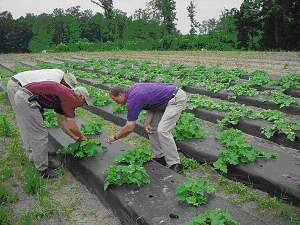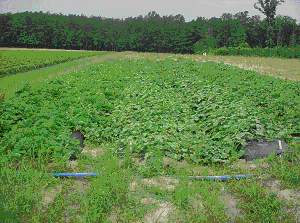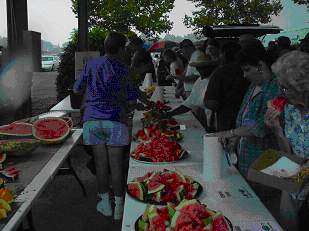Specialty Melon Trial-2003 Report
go.ncsu.edu/readext?452150
en Español / em Português
El inglés es el idioma de control de esta página. En la medida en que haya algún conflicto entre la traducción al inglés y la traducción, el inglés prevalece.
Al hacer clic en el enlace de traducción se activa un servicio de traducción gratuito para convertir la página al español. Al igual que con cualquier traducción por Internet, la conversión no es sensible al contexto y puede que no traduzca el texto en su significado original. NC State Extension no garantiza la exactitud del texto traducido. Por favor, tenga en cuenta que algunas aplicaciones y/o servicios pueden no funcionar como se espera cuando se traducen.
Português
Inglês é o idioma de controle desta página. Na medida que haja algum conflito entre o texto original em Inglês e a tradução, o Inglês prevalece.
Ao clicar no link de tradução, um serviço gratuito de tradução será ativado para converter a página para o Português. Como em qualquer tradução pela internet, a conversão não é sensivel ao contexto e pode não ocorrer a tradução para o significado orginal. O serviço de Extensão da Carolina do Norte (NC State Extension) não garante a exatidão do texto traduzido. Por favor, observe que algumas funções ou serviços podem não funcionar como esperado após a tradução.
English
English is the controlling language of this page. To the extent there is any conflict between the English text and the translation, English controls.
Clicking on the translation link activates a free translation service to convert the page to Spanish. As with any Internet translation, the conversion is not context-sensitive and may not translate the text to its original meaning. NC State Extension does not guarantee the accuracy of the translated text. Please note that some applications and/or services may not function as expected when translated.
Collapse ▲This is a 2003 report from a NC Specialty Crops Program Project. It is posted for historical reference purposes.
Reviewed by Jeanine Davis, NC Alternative Crops & Organics Program, Department of Horticultural Science, NC State University on 10/20/2022.
PROJECT LEADER(S): Charles Mitchell
TYPE OF PROJECT: On-Farm Trial
LOCATION: Vollmer Farm (John Vollmer), Franklin County, NC
IMPACT
This on-farm trial explored the production and marketing potential for specialty melons in Franklin County. Nine different varieties of specialty melons were planted and harvested as needed. A specialty melon tasting at the Franklin County Farmer’s Market was held to determine public interest and preference. Taste tests and sugar content analyses were also conducted at the Vollmer Farm. Three out of the nine melons were selected for optimal production and marketability in Franklin County. These varieties are a good option for growers wanting to diversify farm production and income.
INTRODUCTION
A specialty melon trial was conducted at the Vollmer Farm in Franklin County with the help of a Specialty Crops grant.
METHODS
Nine varieties of specialty melons were planted on black plastic at the Vollmer farm in eastern Franklin County. Plants were started in the field from plugs and watered and fertilized with drip tape. Insecticides were applied as needed to control cucumber beetles. The following varieties were planted: Sprite, Duke, Golden Beauty, Honey Girl, Honey Pearl, Millennium, Gallicum, Sonora, and Sancho.
RESULTS
The melons produced extremely well despite a few problems with mosaic virus. Several vegetable producers had the opportunity to visit the farm and taste as well as check the sugar content of the melons. A melon-tasting day was held at the Franklin County Farmer’s Market to introduce the public to the new melons. Three out of the nine melons were distinctly preferred for purchase at roadside or farmer’s markets. These three melons were Sprite, Golden Beauty, and Honey Pearl.
CONCLUSION
Specialty melons are a good option for farmers wanting to diversify production and garner added income. Several farmers in the county have chosen to produce some of these melons in 2004 and have located seed. The growers have been educated on which melon varieties show the greatest potential according to market demand.
Photos





